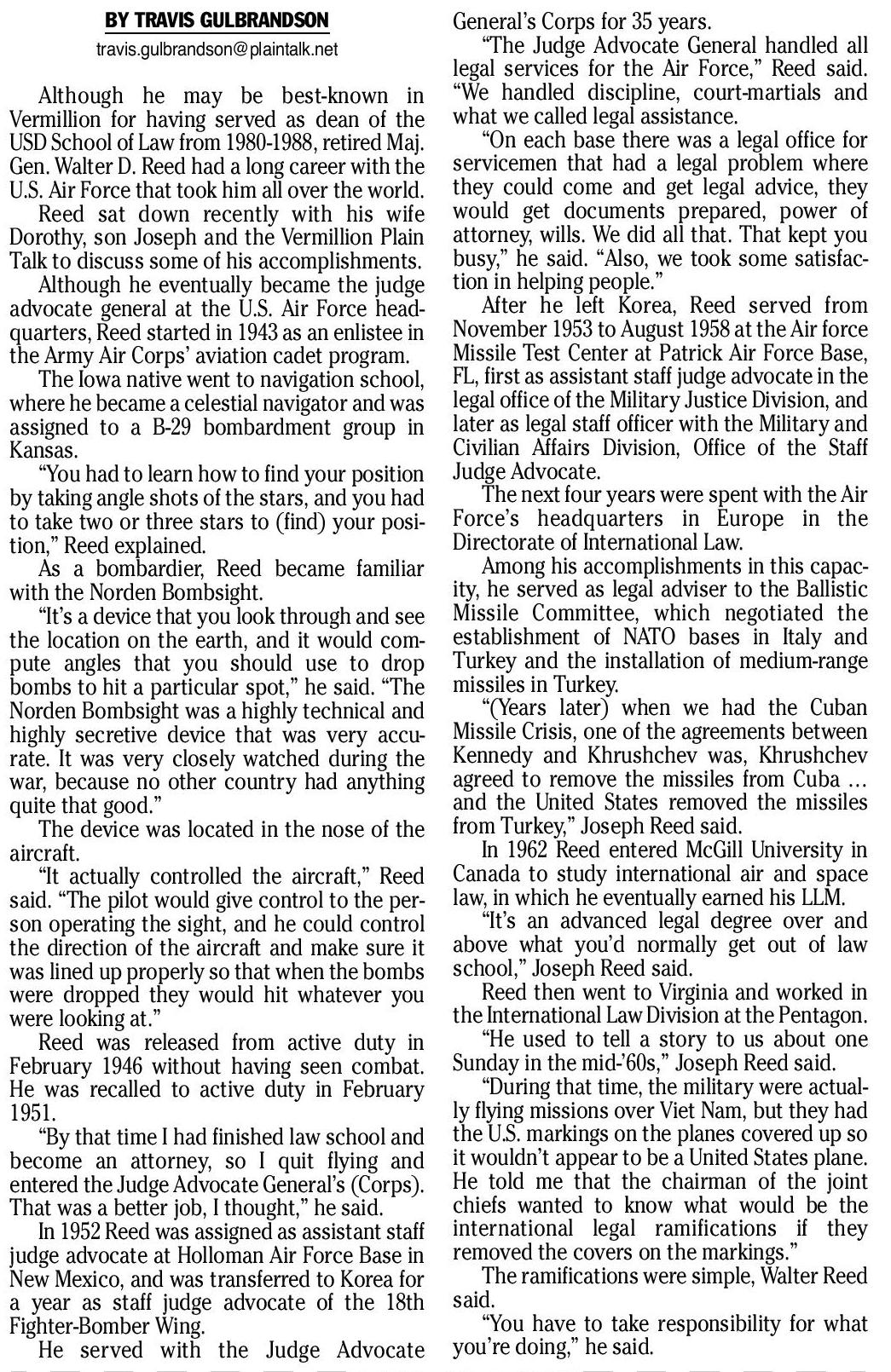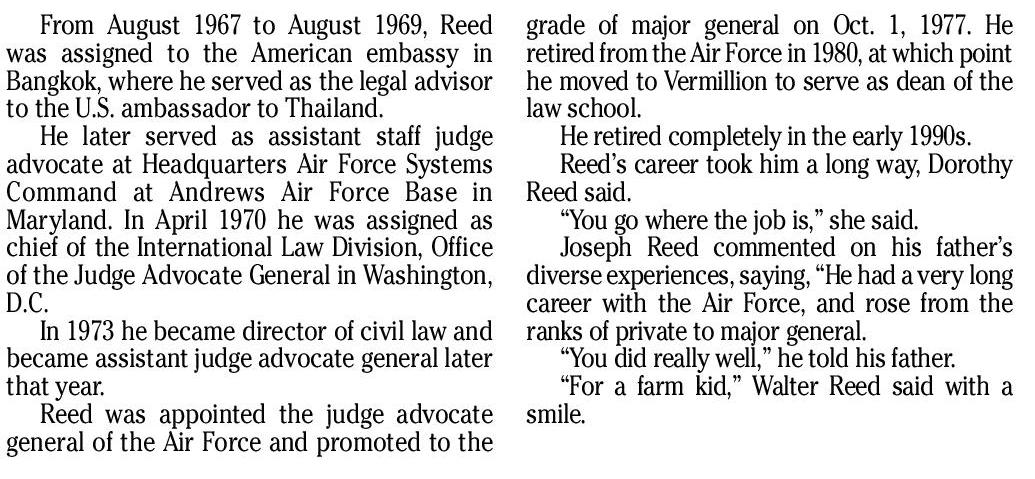9




Heritage 2012: Military 09
November 9, 2012 www.plaintalk.net
Rise of local ‘farm kid’ allowed him to serve nation for decades
BY TRAVIS GULBRANDSON
travis.gulbrandson@plaintalk.net
Although he may be best-known in
Vermillion for having served as dean of the
USD School of Law from 1980-1988, retired Maj.
Gen. Walter D. Reed had a long career with the
U.S. Air Force that took him all over the world.
Reed sat down recently with his wife
Dorothy, son Joseph and the Vermillion Plain
Talk to discuss some of his accomplishments.
Although he eventually became the judge
advocate general at the U.S. Air Force headquarters, Reed started in 1943 as an enlistee in
the Army Air Corps’ aviation cadet program.
The Iowa native went to navigation school,
where he became a celestial navigator and was
assigned to a B-29 bombardment group in
Kansas.
“You had to learn how to find your position
by taking angle shots of the stars, and you had
to take two or three stars to (find) your position,” Reed explained.
As a bombardier, Reed became familiar
with the Norden Bombsight.
“It’s a device that you look through and see
the location on the earth, and it would compute angles that you should use to drop
bombs to hit a particular spot,” he said. “The
Norden Bombsight was a highly technical and
highly secretive device that was very accurate. It was very closely watched during the
war, because no other country had anything
quite that good.”
The device was located in the nose of the
aircraft.
“It actually controlled the aircraft,” Reed
said. “The pilot would give control to the person operating the sight, and he could control
the direction of the aircraft and make sure it
was lined up properly so that when the bombs
were dropped they would hit whatever you
were looking at.”
Reed was released from active duty in
February 1946 without having seen combat.
He was recalled to active duty in February
1951.
“By that time I had finished law school and
become an attorney, so I quit flying and
entered the Judge Advocate General’s (Corps).
That was a better job, I thought,” he said.
In 1952 Reed was assigned as assistant staff
judge advocate at Holloman Air Force Base in
New Mexico, and was transferred to Korea for
a year as staff judge advocate of the 18th
Fighter-Bomber Wing.
He served with the Judge Advocate
General’s Corps for 35 years.
“The Judge Advocate General handled all
legal services for the Air Force,” Reed said.
“We handled discipline, court-martials and
what we called legal assistance.
“On each base there was a legal office for
servicemen that had a legal problem where
they could come and get legal advice, they
would get documents prepared, power of
attorney, wills. We did all that. That kept you
busy,” he said. “Also, we took some satisfaction in helping people.”
After he left Korea, Reed served from
November 1953 to August 1958 at the Air force
Missile Test Center at Patrick Air Force Base,
FL, first as assistant staff judge advocate in the
legal office of the Military Justice Division, and
later as legal staff officer with the Military and
Civilian Affairs Division, Office of the Staff
Judge Advocate.
The next four years were spent with the Air
Force’s headquarters in Europe in the
Directorate of International Law.
Among his accomplishments in this capacity, he served as legal adviser to the Ballistic
Missile Committee, which negotiated the
establishment of NATO bases in Italy and
Turkey and the installation of medium-range
missiles in Turkey.
“(Years later) when we had the Cuban
Missile Crisis, one of the agreements between
Kennedy and Khrushchev was, Khrushchev
agreed to remove the missiles from Cuba …
and the United States removed the missiles
from Turkey,” Joseph Reed said.
In 1962 Reed entered McGill University in
Canada to study international air and space
law, in which he eventually earned his LLM.
“It’s an advanced legal degree over and
above what you’d normally get out of law
school,” Joseph Reed said.
Reed then went to Virginia and worked in
the International Law Division at the Pentagon.
“He used to tell a story to us about one
Sunday in the mid-’60s,” Joseph Reed said.
“During that time, the military were actually flying missions over Viet Nam, but they had
the U.S. markings on the planes covered up so
it wouldn’t appear to be a United States plane.
He told me that the chairman of the joint
chiefs wanted to know what would be the
international legal ramifications if they
removed the covers on the markings.”
The ramifications were simple, Walter Reed
said.
“You have to take responsibility for what
you’re doing,” he said.
Maj. Gen. Walter D. Reed
From August 1967 to August 1969, Reed
was assigned to the American embassy in
Bangkok, where he served as the legal advisor
to the U.S. ambassador to Thailand.
He later served as assistant staff judge
advocate at Headquarters Air Force Systems
Command at Andrews Air Force Base in
Maryland. In April 1970 he was assigned as
chief of the International Law Division, Office
of the Judge Advocate General in Washington,
D.C.
In 1973 he became director of civil law and
became assistant judge advocate general later
that year.
Reed was appointed the judge advocate
general of the Air Force and promoted to the
grade of major general on Oct. 1, 1977. He
retired from the Air Force in 1980, at which point
he moved to Vermillion to serve as dean of the
law school.
He retired completely in the early 1990s.
Reed’s career took him a long way, Dorothy
Reed said.
“You go where the job is,” she said.
Joseph Reed commented on his father’s
diverse experiences, saying, “He had a very long
career with the Air Force, and rose from the
ranks of private to major general.
“You did really well,” he told his father.
“For a farm kid,” Walter Reed said with a
smile.
CLIP N’ SAVE
We are thankful for all the
CLIP N’ SAVE
CLIP N’ SAVE
local veterans who have
$1.00 OFF
ANY REGULAR
905 E. Cherry, Vermillion, SD - 605.624.4191
CLIP N’ SAVE
Expires 12/15/12
served to keep us safe and
protect our freedoms!
1207 Princeton Avenue
Vermillion

















 Previous Page
Previous Page






